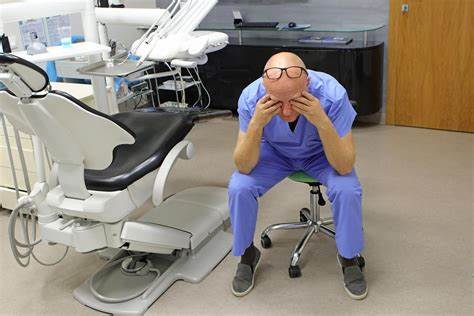Think of a dentist, and others may picture someone who fixes teeth and gums. But a dentist is far more than that. In modern dental practices, a dentist is a manager, accountant, IT expert, marketer, and much more.
Little wonder mental health in dentistry is in free fall.
Dentistry has always been a high-stress profession. However, current trends within the industry are compounding the problems, including the aftermath of COVID-19, social media, and the pressure to centralize support services.
Below, we explore the current state of mental health in dentistry, looking at the underlying causes and what can be done to alleviate the problem.
Dental Mental Health Statistics
First, let’s analyze the present problem. What’s happening to dentists’ mental health?
According to a 2022 study, US dental healthcare workers saw their mental health plummet during the COVID-19 pandemic. Based on monthly anonymous surveys, they found anxiety symptom rates peaked in late 2020, affecting 28% of dental hygienists and 17% of dentists. This declined to 12% for both professions within a year. Meanwhile, depression was also highly prevalent (dental hygienists, 17%; dentists, 10%) – this declined to 8%.
Only in dentistry could one in ten people struggling with mental health be considered a success. However, that survey had a meager response rate of 6.7%.
The more comprehensive 2021 Dental Health and Well-Being Survey Report found that the percentage of dentists diagnosed with anxiety tripled in 2021 compared to 2003. Indeed, it was the third most common medical condition (16%), followed by depression (13%).
Common Dental Mental Health Symptoms
Part of the problem is that dentists often ignore symptoms before it’s too late. Fearing ‘falling behind’ and always striving for perfectionism, neglecting a mental health condition can end up causing more harm to the business and patients.
Common signs of burnout include:
- Chronic fatigue
- Insomnia
- Forgetfulness/impaired concentration
- Physical symptoms (e.g., chest pain, headaches, gastrointestinal pains)
- Loss of appetite
- Anxiety or depression
- Anger
- Loss of enjoyment
- Feelings of apathy and hopelessness
- Increased irritability
- Use of food, drugs, or alcohol to cope
Unless action is taken to relieve the underlying stress, burnout can devastate a dentist’s life, career, and family. Indeed, according to experts, dentists who struggle with stress, depression, burnout, perfectionism, and other mental health disorders are more susceptible to burnout.
Causes of Mental Health Problems in Dentistry
The causes of dental mental health conditions are as multitudinous as the dentists themselves. However, there are common patterns and pitfalls that you can avoid to safeguard against burnout, stress, anxiety, and depression.
Perfectionism
Dentists are high achievers. From early school to running their dental practice, there’s a drive to be the best. That’s not bad in itself. The problem comes when a dentist’s perfectionism leads to setting unreachable or unrealistic goals, constantly feeling unworthy, and catastrophizing over failures.
A classic example is failing to share responsibility. The leader, so concerned with something going wrong, refuses to share the workload, only trusting themselves. In reality, good leaders delegate. Trying to do everything perfectly often means you do many things badly. There’s nothing wrong with aiming high; just set realistic expectations. You’re only human.
Centralized Responsibility
Leading on from perfectionism, centralizing responsibility for all tasks in a dental practice leads to significant stress for the manager in charge: the dentist. Too often, dental practices have an in-house team covering accounts, marketing, IT support, and more.
Taking too much responsibility is a key step toward burnout. Nobody can juggle all these balls and still deliver excellent care to patients. And, when something inevitably goes wrong – be it at home, with patients, financially, or in an area of the business (e.g., cyberattack) – the dentist inevitably blames themselves.
Financial Difficulties
Doing too much and setting unrealistic expectations often results in financial problems. People throw money at a problem, hoping to rectify the issue.
Take centralizing IT responsibilities – that involves hiring, onboarding, and paying the salaries of one or more IT experts. That doesn’t come cheap. Plus, unless you’ve got daily IT issues, that highly paid employee may spend much of their time with nothing to do.
Sooner or later, the costs outweigh the profits, and the practice falls into debt. Financial troubles are one of the top causes of dental mental health problems, causing chronic stress.
Poor Work-Life Balance
Dentists love what they do – but they love their families more. All the time spent working, worrying about financial difficulties, or striving for perfection deters from rejuvenating family time. It’s common today to brag about working harder than the next person.
Social media, for instance, is full of people flouting their life and success. It’s hard not to want to compete. Rarely do people post about a quiet evening playing a board game with their kids or seeing their parents.
But work-life balance is no joke.
Only by relaxing, laughing a little, and spending time with children, spouses, or friends can we return to work, ready to take on the next challenge.
How to Fix the Dental Mental Health Crisis
First, put down social media. As perfectionists, dentists are acutely aware of how they’re doing compared to their peers. It’s not hard to find professionals asking others how to be more successful.
Second, learn to delegate and outsource. For many practices, the root cause is trying to do too much. Better to outsource some (or all) of the non-patient-facing jobs. Outsourcing IT, in particular, could save a business significant time and resources that could be better spent on patient care. Not only will this relieve much of a dentist’s stress, but they’ll also allow them to improve their work-life balance.
Third, minimize your debts. Outsourcing can seem like an added expense. However, it actually helps financially. With regular, set monthly payments, you know your expenses precisely. Moreover, by focusing on patient care, you can deliver better service, improve patient satisfaction, and help grow your practice. (Plus, outsourced services scale as the business does.)
Remember, it’s all about cutting down stress, taking time to heal, and rebuilding your relationships. You’re not alone. Mental health in dentistry is a common problem, and we can tackle it together.
Sources:
https://adanews.ada.org/new-dentist/2022/may/the-burden-of-burnout/
https://jdh.adha.org/content/96/4/9
https://www.ncbi.nlm.nih.gov/pmc/articles/PMC9168629/
https://dentistry.co.uk/2023/10/27/mental-health-social-pressure-and-the-joneses/







